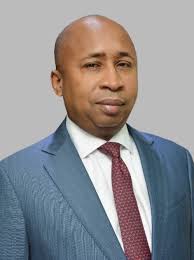E-Financial
CSCS gets GLEIF Accreditation to Perform all LOU Services

The Central Securities Clearing System (CSCS) Plc has been accredited by the Global Legal Entity Identifier Foundation (GLEIF) to perform all Local Operating Unit (LOU) services in Nigeria. This was contained in a letter dated 26 November2018 addressed to the company. The accreditation followed an inspection visit by a team of GLEIF representatives.
The letter signed by Stephan Wolf, the Chief Executive Officer of GLEIF, read in part “please be advised that CSCS Nigeria is being granted authorization to perform all LOU services as defined in the Master Agreement and its Appendices.
“As previously stated, please be assured that the entire GLEIF organization is here to assist and support your efforts and bringing continuous improvement to the entire GLEIS system by facilitating a dedication to “best of breed” practices and methodologies in service and operations”.
In his reaction, Mr. Haruna Jalo-Waziri, the Managing Director/Chief Executive Officer, CSCS Plc, said “we are delighted at this accreditation by GLEIF. CSCS is the only entity in Nigeria that can perform this function.
The Legal Entity Identifier (LEI) would enable firms to strengthen the accuracy, integrity, and aggregation of data across entities and subsidiaries and thus improve counterparty risk data and management, as well as supporting enhanced data modeling and analysis”.
Mr. Jalo-Waziri added that “LEI system will allow precise and accurate regulatory reporting, as well as support the production of data for recovery and resolution planning.
This will inherently lead to operational efficiency that would allow for easy reconciliation of data. I encourage all business entities and organizations to acquire the LEI code or apply to CSCS for renewal if they have already registered”.
Owing to its effectiveness in other jurisdictions, the LEI code is a mandatory global requirement that enables market operators to perform capital market functions; this will further deepen the Nigerian capital market and provide veritable identification of organizations, therefore compliance with this requirement.
A Legal Entity Identifier is a 20-character identifier that identifies distinct legal entities that engage in financial transactions. It is defined by ISO 17442. Natural persons are not required to have an LEI; they are eligible to have one issued, however, but only if they act in anindependent business capacity.
E-Financial
Danjuma, Taj Bank Staff Jailed for 5 Years over N22m Fraud

Economic and Financial Crimes Commission (EFCC) has secured the conviction of Janet Theophilus Danjuma, a bank employee, for defrauding an investor of N22,350,000 through a bogus investment scheme in Kano.

Danjuma was convicted on Monday, by Justice S. M. Shuaibu of the Federal High Court, Kano Division, and sentenced to five years’ imprisonment without the option of a fine.
The defendant, a staff member of Taj Bank Limited, Nai’bawa Branch, was arraigned on a one-count charge bordering on obtaining money by false pretence.
According to the charge, Danjuma, sometime in October 2024 in Kano, dishonestly obtained N22,350,000 from one Wade Bamaiyi under the guise of investing the funds in Taj Bank’s CASA (Current Account Savings Account) programme.
The charge stated: “Janet Theophilus Danjuma, being a staff of Taj Bank Limited, Nai’bawa Branch Kano, sometime in October 2024 in Kano, within the jurisdiction of this Honourable Court, with intent to defraud, did obtain the sum of N22,350,000 from Wade Bamaiyi under the pretext that the money would be invested in CASA Programme of Taj Bank Limited, which pretext you knew to be false and thereby committed an offence contrary to Section 1(1)(b) and punishable under Section 1(3) of the Advance Fee Fraud and Other Fraud Related Offences Act, 2006.”
She pleaded guilty when the charge was read to her.
Sadiq Huseini, prosecuting counsel, while reviewing the facts of the case, told the court that the defendant exploited the name of a legitimate banking product to gain the confidence of her victim.
“The defendant used her position as a bank staff and the credibility of an existing financial product to deceive the complainant into parting with N22,350,000,” Huseini said. “Investigation traced the entire sum to her personal account.”
He urged the court to convict and sentence her in accordance with the law, arguing that the offence undermined public trust in the financial system.
In his ruling, Justice Shuaibu convicted Danjuma based on her guilty plea and sentenced her to five years’ imprisonment without an option of fine.
The EFCC said the conviction followed investigations which revealed that the so-called investment scheme was non-existent and that the funds were diverted for personal use.
E-Financial
KPMG Outlook Reveals Financial Services CEOs Double down on AI, Resilience and Growth in 2026

Financial services leaders across Africa are entering 2026 with renewed confidence, placing artificial intelligence (AI), cybersecurity, regulatory resilience and strategic growth at the centre of their transformation agendas.

This is according to insights from KPMG’s 2025 Global CEO Outlook, with a focus on the Banking and Capital Markets, and Insurance sectors.
Despite ongoing geopolitical uncertainty, economic volatility and regulatory complexity, CEOs across both sectors are demonstrating strong appetite for growth and technology-led reinvention.
Insurance: Confidence rising as technology and sustainability reshape the sector
Insurance CEOs are increasingly confident in their organisations’ growth prospects. Globally, 82% of insurance CEOs are confident in their company’s growth, up from 74% in 2024, a significant year-on-year increase. Expansion across health, life and specialty lines, including cyber and business interruption, is contributing to improved earnings and sector momentum.
AI adoption is accelerating across underwriting, onboarding, claims processing and cyber defence. Globally, 67% of CEOs expect returns from AI investments within one to three years, compared to 21% last year, and two thirds plan to allocate 10–20% of their budgets towards AI initiatives.
Workforce transformation is a parallel priority. Seventy-seven percent of global insurance CEOs cite AI workforce readiness and upskilling as a top constraint on growth, while 83% say AI is reshaping training and development, and 79% believe it is changing the skills required for entry-level roles.
Sustainability and ESG compliance remain high on the agenda, particularly as regulatory standards tighten globally. More than half (55%) of global insurance CEOs identify ESG reporting and compliance as their primary ESG priority. Given that many African regulatory frameworks follow European trends, this is a critical area of focus for insurers across the continent.
Cyber risk remains a dominant concern. Eighty-three percent of insurance CEOs identify cybercrime as the biggest barrier to organisational growth, with cybersecurity and digital risk resilience ranking as the leading area for risk mitigation investment.
Mark Danckwerts, Head of Insurance, KPMG One Africa said: “Insurance leaders across Africa are navigating a complex operating environment, but they are doing so from a position of growing confidence. AI presents enormous opportunity to improve efficiency, risk assessment and customer engagement.
“However, sustainable success will depend on responsible adoption, workforce readiness and strong cyber resilience. Insurers that balance innovation with trust will be best placed to outperform.”
The appetite for inorganic growth remains strong, with the insurance sector showing one of the highest levels of high-impact mergers and acquisitions (M&A) activity globally, a trend reflected in several African markets in recent years.
Banking and Capital Markets: AI at the heart of strategic reinvention
For banks across Africa, AI is the predominant theme shaping CEO priorities.
“Technology, in particular AI, presents a huge opportunity, but also a challenge in terms of where to prioritise, how to achieve a measurable return on investment (ROI), and how to ensure responsible and safe adoption to maintain trust,” said Pierre Fourie, KPMG One Africa Head of Financial Services.
“Banks need to modernise legacy IT, cope with rising financial crime risk, made more difficult by sophisticated scams using AI, address new competitive threats from fintechs and nimble, cloud-native banks, and comply with complex and changing regulations.”
AI is seen as both an enabler and a risk amplifier. It can significantly enhance customer engagement and deepen understanding of customer needs, yet banks must guard against depersonalising interactions and losing the human touch. At the same time, AI raises the cyber threat landscape while also strengthening banks’ ability to detect and defend against bad actors.
The scale of planned investment is notable:
-70% of banking CEOs expect to spend 10–20% of their budgets on AI in the next 12 months.
– 69% expect ROI from AI investments within one to three years, up sharply from 13% last year.
– 78% say AI workforce readiness or AI upskilling could negatively impact the organisation if not adequately addressed.
The top five trends negatively impacting organisational prosperity in banking are:
– 86% – Cybercrime and cyber insecurity
– 78% – AI workforce readiness
– 77% – Successful integration of AI into business processes
– 75% – Competition for AI talent
– 75% – Cost of technology infrastructure
Fourie added: “For African banks, AI is not a theoretical discussion — it is a strategic imperative. The ability to integrate AI into core processes, manage cyber risk and build the right talent base will determine competitive advantage.
At the same time, banks must modernise legacy systems and manage infrastructure costs, all while protecting trust in an increasingly digital ecosystem.”
Inorganic growth also remains firmly on the agenda. Appetite for strategic transactions is high, with CEOs seeking differentiation through innovation, customer experience and new business models.
Notably, 25% of banking CEOs identify ‘strategic differentiation’ as the primary driver of AI adoption, signalling that technology investment is increasingly linked to long-term competitive positioning rather than short-term efficiency alone.
A Pan-African moment for financial services transformation
Across both insurance and banking, a common theme emerges: confidence underpinned by disciplined transformation. AI investment is accelerating, cybersecurity is paramount, ESG compliance is rising in importance, and M&A remains a lever for scale and capability.
For African financial institutions, the challenge, and opportunity, lies in balancing innovation with resilience, and growth with governance.
E-Financial
DMO Offers ₦800bn FGN Bonds in February Auction Surge

Debt Management Office (DMO) plans to raise ₦800 billion through Federal Government of Nigeria (FGN) bonds in February 2026, a 128.6% jump from the ₦350 billion mobilised last year, highlighting the government’s deepening reliance on domestic debt to bridge budget shortfalls and fund infrastructure amid elevated interest rates.

DMO
The auction, slated for February 23 with settlement on February 25, spans three tenors tailored for institutional investors like Pension Fund Administrators (PFAs), insurers, and high-net-worth individuals, with a minimum bid of ₦50,001,000.
These tax-exempt bonds under the Company Income Tax Act (CITA) and Personal Income Tax Act (PITA) draw strong interest, fuelling Q3 2025’s $4.85 billion portfolio inflows as noted by the National Bureau of Statistics (NBS), with analysts forecasting oversubscription despite a dip from January’s ₦900 billion float.
While yields near 20% on the 10-year paper reflect fiscal strains and a hawkish Central Bank stance—mopping up liquidity to tame inflation and luring foreign portfolio investment—the strategy doubles as a tightrope, curbing private sector borrowing while locking in long-term, inflation-hedging returns for investors.
Nigeria CommunicationsWeek anticipates keen market focus on the stop rates as DMO taps domestic savings for national development.

 General News3 days ago
General News3 days agoJumia Targets Break-even in 2026 After Strong Q4 Surge

 General News3 days ago
General News3 days agoNigeria’s Banks Race to Meet CBN Recapitalisation Deadline Amid Verification Push

 General News3 days ago
General News3 days agoBOI, MTN Foundation Unveil N1Bn Fund for Women Entrepreneurs

 General News2 days ago
General News2 days agoUBA Unveils Diaspora Platform to Connect Global Africans with Investment, Wealth Opportunities

 E-Financial3 days ago
E-Financial3 days agoNo VAT on Land, Buildings and Rent Under New Tax Law — Oyedele

 News2 days ago
News2 days agoAfrican Leaders Highlight Africa’s AI Ambitions

 E-Financial3 days ago
E-Financial3 days agoCBN Slams Up to N10m Fine on Banks and Cheque Printers for Security Breaches

 General News2 days ago
General News2 days agoNDPC Orders Probe into Temu over Alleged Data Privacy Breaches




















